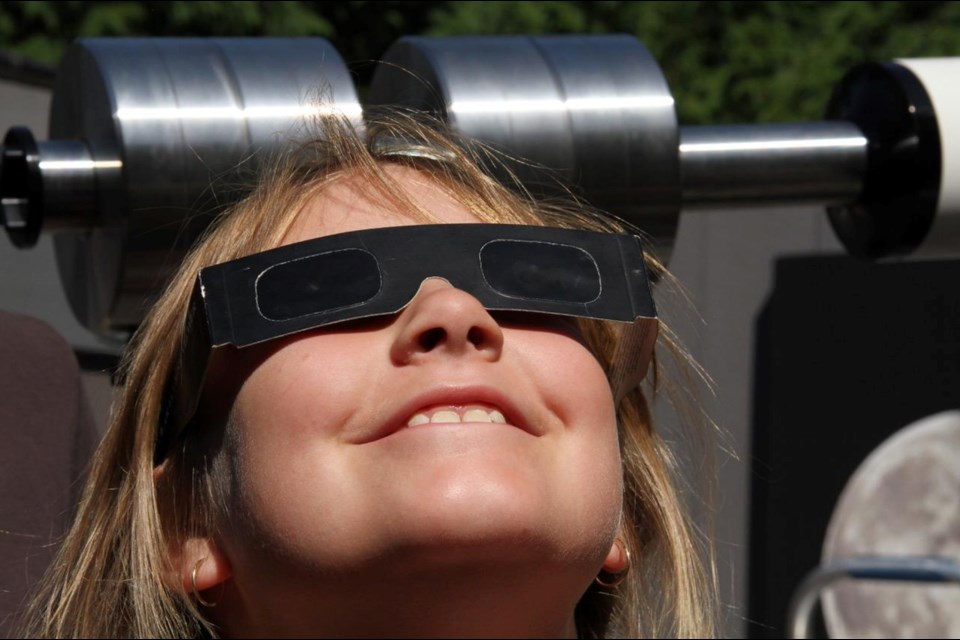Residents of Niagara Region will be among the few in Ontario to have a front-row seat on a once-in-a-lifetime event around this time next year.
And at least one local resident thinks we should be doing everything we can to prepare, as others are going to want to join us.
Local resident Wayne Liebau made a presentation to Pelham town council this week explaining that the Niagara Region will be in the “path of totality” for the April 8, 2024, total eclipse of the sun.
Based on the public’s response in the U.S. to an eclipse in 2017, next year’s event could prompt huge numbers of visitors.
Liebau’s presentation captured his excitement around the event, but also emphasized what he thinks is the need for preparation in the area of community events, infrastructure and safety precautions in advance of the eclipse.
Here’s the text of his presentation to the town:
On the afternoon of April 8, 2024, Pelham will have the extraordinarily good fortune of lying within the narrow path of a total eclipse of the sun, as the Moon’s shadow sweeps across the continent in broad daylight.
The event will be brief but hugely popular.
Because of Niagara’s highly favoured position along the path of totality, it offers the best potential viewing in central Canada.
Outside the zone of totality there is a partial eclipse, with less and less of the Sun covered as distance increases.
It’s important to know that even a 99% partial eclipse, while dramatic, is not like a total eclipse.
It will get dark enough that birds will go silent, automatic lights will come on, and, if skies are clear, some stars will pop out.
What are our chances of having decent skies? Early April is notoriously variable – there could be anything from snowstorms to clear and warm conditions.
Based on more than 50 years of records, I estimate we have about a 50:50 chance of decent viewing.
People will travel - sometimes great distances - to see a total eclipse.
That afternoon, millions of people will travel to be in the path of totality.
Regardless of our uncertain skies, LOTS of people will come to Niagara.
How many? Most Ontarians, including those in the most densely populated parts of the Golden Horseshoe, live outside of the zone of totality.
Better weather prospects in Mexico and Texas may attract dedicated eclipse-chasers. But for millions of Canadians, Niagara is the closest destination.
Some will come just for the day’s event. Others will plan vacations around it.
Depending on near-term weather forecasts, many people may attempt to travel last-minute, into or out of Niagara.
Then there is the inevitable mass exodus when the event ends.
Travel conditions will be difficult, especially on April 8, but also before and after.
If anyone is wondering whether it will really be such a big deal, this will be a major event.
During the 2017 eclipse that crossed the U.S., not only was the eclipse path zone in the eastern U.S. crowded, but remote parts of the West were jammed beyond anything locals had ever seen.
Even with advance planning, many areas saw groceries, fuel and general supplies run low.
Johnnie-on-the-Spot rentals were sold out years before.
Accommodations were sold out years in advance; prices went stratospheric; at least one state had to grapple with forced cancellations and price-gouging; everyone with a bit of land seemed to be renting space for “dry camping”.
Lucky as we are to be in the path this time, there are significant ramifications beyond travel headaches.
For example, there are implications for:
- Emergency services (police, fire, ambulance, hospitals)
- Accommodations, from hotels to campgrounds (which will be fully booked)
- Tourist operations
- Service businesses such as restaurants, grocery stores, gas stations, Johnny-on-the-Spot rentals, retail entrepreneurs, etc. (employers should also plan for the fact that many workers will justifiably want to watch the eclipse)
Positive aspects range from relatively mundane commercial prospects to once-in-a-lifetime opportunities in the cultural and educational fields.
This is a huge opportunity for the Town and for all educational institutions.
Though weather conditions will have an influence on numbers, Niagara will be crowded. Supplies of many types may be stretched. Traffic will likely be a nightmare.
Preparedness can ensure that challenges don’t diminish a wonderful event.
Planning is essential and cannot start too soon.
Pelham can:
- Work with other levels of government, relevant agencies & institutions, school boards, business associations, Chambers of Commerce, etc.
- Organize and support local publicity; educate the public, including about viewing safety
- With others, such as the Niagara Centre of the Royal Astronomical Society of Canada, and John Nemy and Carol Legate of the Island Stars Observatory, plan public events
- Identify public and private lands for eclipse viewing
- Consider promptly obtaining supplies of proper eclipse glasses
- Strategize how to accommodate visitors: nearby municipalities have more options, but Pelham should do its part. For example, with normal accommodations being full, plan how to make extra trailer camping available, potentially for several days.
- Plan for visitors – most will have no idea where things are or where to go. Do it right so they are attracted to return another time.
- GET GOING NOW!
We are in the path of one of nature’s most spectacular and rare phenomena.
Let’s be ready.
